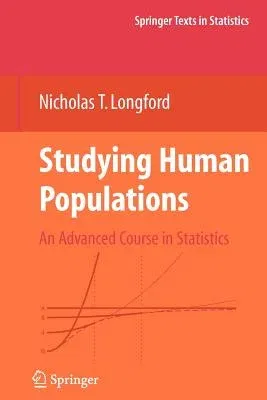Nicholas T Longford
(Author)Studying Human Populations: An Advanced Course in StatisticsPaperback, 23 November 2010

Qty
1
Turbo
Ships in 2 - 3 days
In Stock
Free Delivery
Cash on Delivery
15 Days
Free Returns
Secure Checkout
Part of Series
Springer Texts in Statistics
Print Length
474 pages
Language
English
Publisher
Springer
Date Published
23 Nov 2010
ISBN-10
1441931562
ISBN-13
9781441931566
Description
Product Details
Author:
Book Format:
Paperback
Country of Origin:
NL
Date Published:
23 November 2010
Dimensions:
23.39 x
15.6 x
2.54 cm
ISBN-10:
1441931562
ISBN-13:
9781441931566
Language:
English
Location:
New York, NY
Pages:
474
Publisher:
Series:
Weight:
689.46 gm

